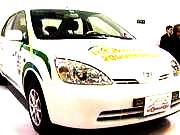|
Auto Craze in China
央视国际 2003年05月13日 09:55
One of the first things that may strike western visitors to China is the number of bicycles on the streets of its major cities. But that is about to change. A recent survey conducted by the China Consumers Association found that a staggering 32% of China's urban population plan to buy cars within the next 5 years. That's over 3 million new cars on the streets of Beijing alone.
The Chinese are passionate about their cars and eager to bone up on all things automotive. China's numerous car markets and garages, show rooms and accessory shops, car magazines and exhibitions all demonstrate the beginning of the country's auto era. The annual Automechanika China (China's International Auto Industry Exhibition) is fast becoming the most popular event of the year. Whether it's held in Beijing or Shanghai there is always an air of excitement at the exhibition and a strong feeling of optimism and opportunity which many westerners may find difficult to understand.
|

|
|
|
Because of the costs involved, owning a private car in China is still considered to be the ultimate status symbol. But as the price goes down and the population becomes more affluent, the number of cars sold in China will increase dramatically. US-based General Motors predict that by 2025 the Chinese market will be bigger than the American market. Research has shown that when a country's average per capita GDP is between 1,000---10,000 US dollars a year, its automobile industry will enjoy a period of exceptional growth. The average GDP in China is now close to this standard, and in large cities such as Beijing and Shanghai the average is much higher.
Car prices have also come down, especially after China's WTO accession. According to the bilateral agreements signed under WTO, China's heavily-protected auto market will face significant changes. Tariffs will be phased out by 2005, and American financial firms will be allowed to provide loans for car purchase in China. All this means that the price of imported cars will fall dramatically and domestic producers will be forced to follow suit.
Because owning a private car in China is still considered to be a symbol of wealth when it comes to purchase for most Chinese, it's often a case of the bigger the better. But as private cars move from the realm of luxury to necessity, it is expected that smaller, and more economical models will come to dominate the market. The Government is now finalizing its 10th Five-Year Plan (2001-2005) which aims to respond to some of the challenges posed by entry into the WTO. It states that the auto industry will focus on the development of safe and energy-efficient cars. Domestic and foreign manufacturers have launched a range of new models which are gaining wide attention such as the Buick Sail produced by General Motors in Shanghai and Tianjin's Xiali 2000.The Chinese manufacturer Geely, Wuhan-based Aeolus-Citreon and Jetta and Santana manufactured by Shanghai-Volkswagen all produce small economical cars.
As many western countries struggle to cope with some of the negative effects of car culture, such as polluted cities and congested roads, China is preparing to embrace its own age of the car with enthusiasm. So how can the mistakes made elsewhere be avoided here?
TO encourage the use of small, energy-efficient cars, the Chinese Government has introduced a 30% reduction in consumption tax for cars which meets Euro II Environmental Protection Criteria. It is hoped that this will encourage domestic manufacturers to produce greener cars. Tax on private cars certified as energy-efficient has also been reduced by as much as 50%. According to the exhaust emission standard published by Beijing Municipal Technical Supervision Bureau in August 1998, all new cars produced in China must be fitted with an electronic fuel injector and a catalytic converter.
Private car consumption is the driving force behind the rapid growth of China's automotive industry, and as the market grows it is becoming much more diverse. Imported cars, particularly Mercs and BMWs, are the most famous luxury cars available in China. At the other end of the scale, China is also gaining popularity. The Government's long awaited policy document on the automotive industry is expected in the first quarter of this year. lt is hoped that it will cancel some of the arbitrary charges and fees imposed on car buyers and end regional protectionism by imposing a single national levy.
|